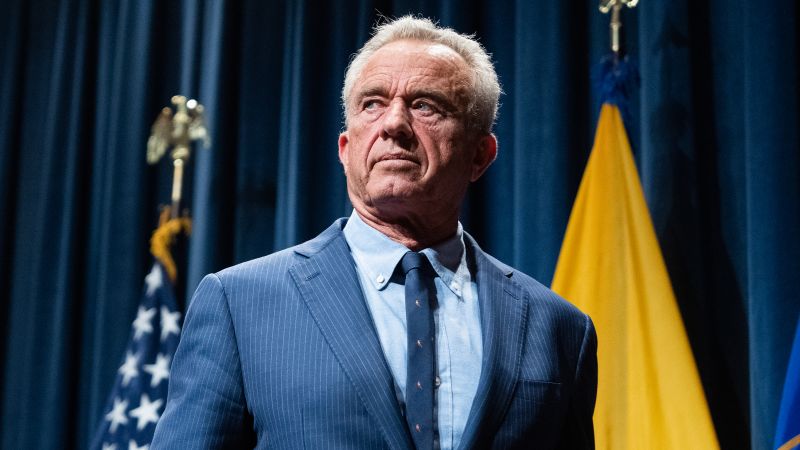Alison Singer has voiced her concerns regarding the remarks made by Robert F. Kennedy Jr., the recently appointed Secretary of the U.S. Department of Health and Human Services. As the president of the Autism Science Foundation, Singer has a personal stake in this matter; her brother and daughter both live with autism. She claims that their experiences and those of millions of others in the autism community have been fundamentally misrepresented and disrespected by Kennedy’s comments.
In a recent statement, Singer highlighted that Kennedy seemed to portray the lives of people with autism as insignificant or worthless, a view she passionately argues is entirely incorrect. Singer’s daughter lives a fulfilling life, contributing to her community by working on a farm where she cares for animals and cultivates crops. Her brother, on the other hand, resides in a group home and is actively involved in delivering meals to senior citizens. Both individuals, according to Singer, lead rich, meaningful lives that contradict the negative narrative Kennedy attempted to convey.
During his inaugural news conference as HHS Secretary, Kennedy characterized the increasing prevalence of autism in the U.S. as a “catastrophic” tragedy, suggesting that it poses a significant issue for the nation. His assertion followed a report from the Centers for Disease Control and Prevention indicating a rise in autism rates among children aged eight, escalating from an estimated 1 in 36 children in 2020 to 1 in 31 children by 2022. However, experts believe that this trend is largely due to improved knowledge and screening concerning autism rather than an actual surge in cases.
Kennedy’s claims that autism is a “preventable” condition align with his assertion that it is part of a chronic disease epidemic that threatens to harm children and families. He further provided a disheartening description of individuals with autism, stating they are often unable to hold jobs, engage in common social activities, or even use the restroom unaided. Such remarks drew swift condemnation from individuals and organizations advocating on behalf of the autism community, who claim that they trivialize the lives and capabilities of these individuals.
Dr. Peter Hotez, a respected vaccine researcher with a personal connection to autism through his daughter Rachel, went public to dispute Kennedy’s statements. Hotez emphasized that his daughter, despite living with autism, leads a productive life, has friends, pays taxes, and enjoys various leisure activities, which contradicts Kennedy’s bleak portrayal. He voiced his concern about the lack of empathy and understanding demonstrated by the HHS, showcasing a disconnect between the agency and the lived experiences of individuals with autism.
And yet, Kennedy’s comments reverberated through the community, prompting a heated dialogue around the stigmatization and misconceptions surrounding autism. Zoe Gross, the director of advocacy at the Autistic Self Advocacy Network, articulated her disappointment at the regression this rhetoric signifies, harkening back to a time when such damaging stereotypes prevailed. Gross declared that Kennedy’s terming of certain lives as “worthless” is unacceptable, especially given the progress made in destigmatizing autism.
Prominent organizations have rallied to challenge Kennedy’s narrative, highlighting the valuable contributions made by individuals with autism. For instance, technology company Aspiritech, where over 90% of the workforce consists of people with autism, publicly invited Kennedy to witness firsthand the skills and capabilities of their team, aiming to dismantle the false narrative he put forth.
Autism spectrum disorder (ASD) encapsulates a diverse range of neurodevelopmental conditions, and the breadth of experiences among individuals with autism is vast. According to the CDC, those diagnosed may communicate and learn differently, and their abilities can vary significantly. Dr. Lisa Settles, a leading researcher at Tulane University’s Center for Autism and Related Disorders, emphasized that every individual with autism possesses unique value, often drawing on over 20 years of experience in the field.
Kennedy’s subsequent appearance on a major news network allowed him to further clarify his statements, but not without igniting further backlash regarding his portrayal of severe autism and mischaracterizations of the condition in general. Experts and advocates have reiterated that defining autism solely through a limited lens—particularly focusing on those who require greater support—has dire implications for the understanding and treatment of the broader autism community.
In light of Kennedy’s declaration of a “massive testing and research effort” aimed at uncovering the causes of what he terms the “autism epidemic,” advocates express reservations about this focus undermining established science that has repeatedly debunked vaccine-autism links. They are advocating instead for a more nuanced exploration of how to support and uplift those living with autism.
As debate continues, the commitment to respect and value individuals on the autism spectrum remains paramount. Singer and others urge the community at large to recognize that every individual, regardless of support needs, has the right to a satisfying and meaningful life, free from the stigma propagated by reductionist views.












